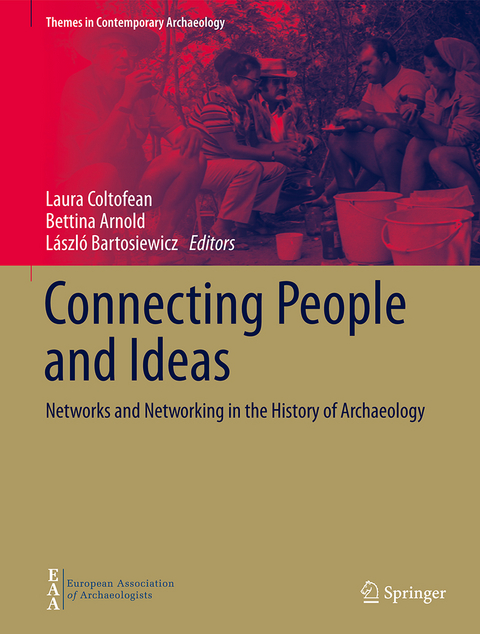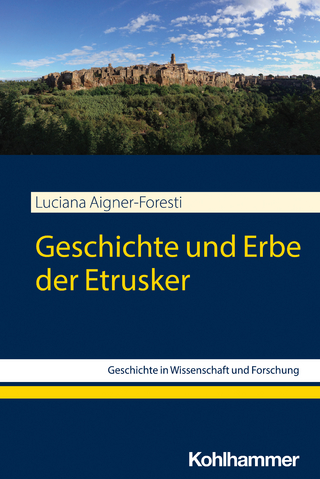
Connecting People and Ideas
Springer International Publishing (Verlag)
978-3-031-81005-3 (ISBN)
- Noch nicht erschienen - erscheint am 16.03.2025
- Versandkostenfrei innerhalb Deutschlands
- Auch auf Rechnung
- Verfügbarkeit in der Filiale vor Ort prüfen
- Artikel merken
This book presents new research into social networks and the various networking modes that formed during the history of archaeology in distinct geographical settings in Europe, North America, and South Asia in the nineteenth and twentieth centuries. The diverse range of international experts in this edited collection demonstrate that networks can be found everywhere in archaeology, making it a highly interconnected research field.
Using a wide array of examples from diverse geopolitical, cultural, and social contexts, the volume reveals how essential social networks and networking have been to the development of archaeology; to the production, transfer, exchange, and dissemination of archaeological and cross-disciplinary knowledge; and to the formation, upward mobility, barrier transcendence, research, and association of archaeological practitioners. The book is of interest to students and scholars of history of archaeology, history of science, museum studies and interdisciplinary studies.
Laura Coltofean is an archaeologist and historian whose research focuses on the development of interdisciplinary practices, knowledge production and transfer, social networks, and political ideologies in the history of European archaeology, as well as on gender issues, oppressive behaviours, safety, and well-being in the current archaeological profession. She is a member of Research Cluster 5: History of Archaeology of the German Archaeological Institute. Previously, she was a research assistant, DAAD and DAI Postdoctoral Research Fellow at the Römisch-Germanische Kommission of the German Archaeological Institute, Germany (2021-2022), a researcher at the University of Barcelona, Spain (2018-2020), and a museum curator at the Brukenthal National Museum in Sibiu, Romania (2012-2018). She is an active member of international professional and scientific networks, such as the European Association of Archaeologists, the Archaeology and Gender in Europe Community, the European Society for the History of Science, and the International Union for Prehistoric and Protohistoric Sciences, some of which she has served as co-chair and secretary. Her recent publications include the edited collections Interdisciplinarity and archaeology: Scientific interactions in nineteenth- and twentieth-century archaeology (Oxbow Books, 2021; with M. Díaz-Andreu), Gender stereotypes in archaeology: A short reflection in image and text (Sidestone Press, 2021; with B. Gaydarska and U. Matic), Handbook of the history of archaeology (Oxford University Press, 2024; with M. Díaz-Andreu), Gender trouble and current archaeological debates (Springer, 2024; with U. Matic, B. Gaydarska and M. Díaz-Guardamino), and Archaeology and the global Cold War: Scientific practices and political ideology (Routledge, forthcoming 2025; with S. Grunwald, F. Link and K. Rösler).
Bettina Arnold obtained her BA in Archaeology from Yale University and her MA and PhD degrees in Anthropology from Harvard University. She is a Full Professor of Anthropology at the University of Wisconsin-Milwaukee and Adjunct Curator of European Archaeology at the Milwaukee Public Museum. Her research interests include pre-Roman Iron Age Europe, the archaeological interpretation and analysis of complex societies as reflected in mortuary contexts and the production and consumption of alcoholic beverages; the archaeological interpretation of gender; and the socio-political history of archaeology and museums in nineteenth and twentieth century nationalist and ethnic movements in Europe and the United States. She published a ground-breaking article on the use and abuse of archaeology for political purposes in Nazi Germany in Antiquity in 1990 that has been reprinted repeatedly since first appearing. As a bilingual dual citizen who conducts research in southwest Germany but was raised and educated in the United States, she can relate to the experience, both positive and negative, of serving as a conduit for trans-Atlantic information transfer. The final report of the excavations she co-directed in two early Iron Age burial mounds near the Heuneburg hillfort on the Danube River in Swabia will appear in two languages next year.
László Bartosiewicz is an archaeozoologist working at the Osteoarchaeological Research Laboratory at Stockholm University, Sweden. He studied Animal Science at the University of Gödöllö, Hungary. He was granted a DSc degree by the Hungarian Academy of Sciences for his work on the archaeology of cattle exploitation. Between 1978-1995 he worked as full-time researcher at the Archaeological Institute of the Hungarian Academy of Sciences. His research interests include human-animal relationships throughout history, as well as the variability of using animals as media in human communication. His specialization in animal palaeopathology helps fine-tuning the osteological ev
Chapter 1. Social Networks and Networking in the History of Archaeology: An Introduction (Coltofean et al).- Chapter 2. In the Archive of Agda Montelius, or How to Find the People and Practices Behind a Great Man's Work (Gustavsson).- Chapter 3. Caroline Ransom Williams and the Foundations of Egyptian Archaeology in the United States (Sheppard).- Chapter 4. The Dutch Years of F. W. Freiherr von Bissing (1922-1926): Networks, Egyptian Objects, and an Academic Persona on the Move (Eickhoff & Smith).- Chapter 5. Antiquaries and Indian Agents: "Field Networks" of Ethnology and Archaeology in the North American Southwest, 1860-1880 (Snead).- Chapter 6. "Lieber Freund!" Nineteenth-Century Correspondence Networks and the Early History of the Milwaukee Public Museum (Arnold).- Chapter 7. Gábor Szinte and the Role of Networks in Early Research on Medieval Monuments in Nineteenth-Century Transylvania (Codrea & Bodó).- Chapter 8. Archaeological Sociability: Building Patriotic and Scientific Networks in Italy (1861-1915) (Pizzato). Chapter 9. Celticism and the Volk: Tracing the Ideas and Networks that Shaped Irish Archaeology (Whitefield).- Chapter 10. The Young Bairrão Oleiro and the Building of an International Scientific Network (Martins).- Chapter 11. Creating Authority in South Asian Archaeology: Mortimer Wheeler, Stuart Piggott, and Archaeological Knowledge in India (Miller).- Chapter 12. Archaeology and Networks of Authorities in a State of War: The Four-Level System in Sicily (1939-1943) (Crisà).- Chapter 13. Archaeological Learned Societies in the Kingdom of Yugoslavia (1918-1941): Changing States and Roles (Lorber).- Chapter 14. Between Two Stools: Miodrag Grbic and the Archaeological Networks Formed Around the American and German Expeditions to Yugoslavia in the 1930s (Bandovic).- Chapter 15. When Paradigms Meet: American and Yugoslav Archaeologists and the Neolithic in the 1960s and 1970s (Rasson).- Chapter 16. Fifty Years of Networking in Archaeozoology (Bartosiewicz).
| Erscheint lt. Verlag | 16.3.2025 |
|---|---|
| Reihe/Serie | Themes in Contemporary Archaeology |
| Zusatzinfo | IV, 246 p. 43 illus., 13 illus. in color. |
| Verlagsort | Cham |
| Sprache | englisch |
| Maße | 210 x 279 mm |
| Themenwelt | Geisteswissenschaften ► Archäologie |
| Geschichte ► Allgemeine Geschichte ► Altertum / Antike | |
| Schlagworte | 19th c. correspondence networks • Agda Montelius and Italy • Archaeological networks socio-political disruptions upheavals • Archaeology and identity • Archaeology and politics • archaeology and society • Communication in archaeology • Dissemination in archaeology • early history of the Milwaukee Public Museum • Egyptian Archaeology in the United States • F.W. Freiherr von Bissing Networks, Egyptian objects • F.W. Freiherr von Bissing Networks, Egyptian objects • Information transfer in archaeology • Knowledge production in archaeology • Lluis Pericot archaeology • Networking in archaeology • Networks, collectors, antiquities American Southwest, 1880-1900 • Networks in archaeology • pioneering women archaeologists in 20th-century Greece • prehistoric archaeology 19th century Hungary • South Asian Archaeology |
| ISBN-10 | 3-031-81005-8 / 3031810058 |
| ISBN-13 | 978-3-031-81005-3 / 9783031810053 |
| Zustand | Neuware |
| Informationen gemäß Produktsicherheitsverordnung (GPSR) | |
| Haben Sie eine Frage zum Produkt? |
aus dem Bereich


